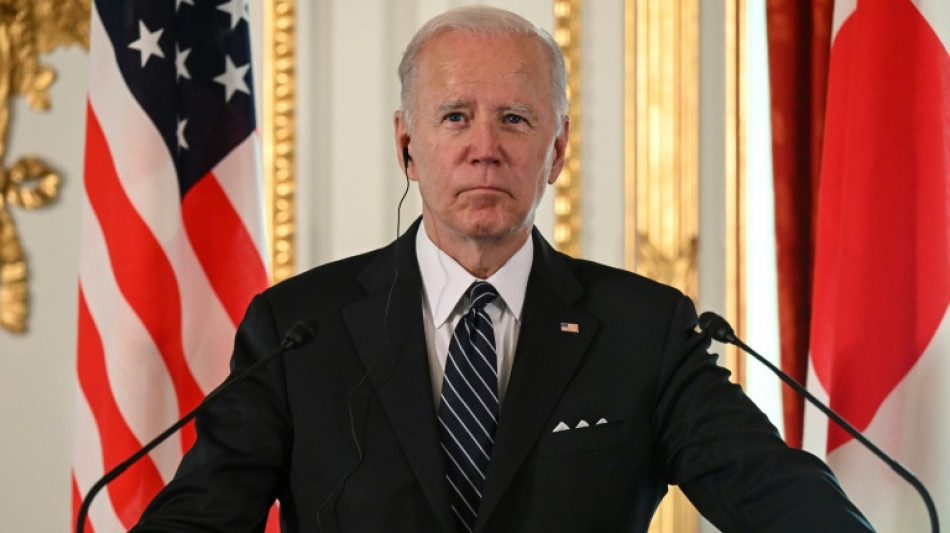
-
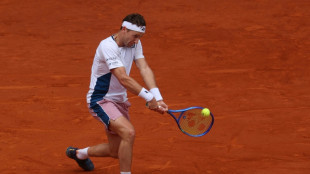 Ruud sails past Medvedev into Madrid Open semis
Ruud sails past Medvedev into Madrid Open semis
-
'Not a commodity': UN staff rally over deep cuts
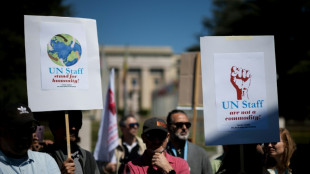
-
 Flintoff proud as Afghan refugee protege plays for Lancashire second team
Flintoff proud as Afghan refugee protege plays for Lancashire second team
-
Peruvian cardinal accused of abuse challenges late pope's sanction
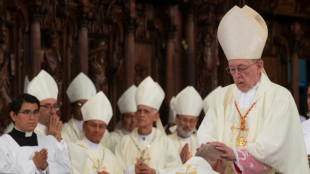
-
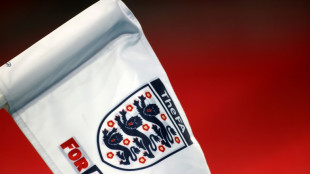 Trans women barred from women's football by English, Scottish FAs
Trans women barred from women's football by English, Scottish FAs
-
Oil prices drop, stocks diverge amid economic growth fears
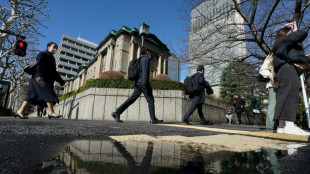
-
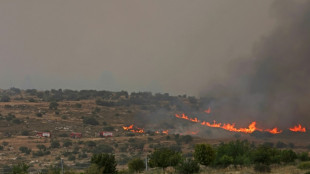 Israel brings fire near Jerusalem 'under control', reopens roads
Israel brings fire near Jerusalem 'under control', reopens roads
-
Lopetegui appointed coach of Qatar

-
 UK counter-terrorism unit probes rappers Kneecap but music stars back band
UK counter-terrorism unit probes rappers Kneecap but music stars back band
-
Yamal heroics preserve Barca Champions League final dream
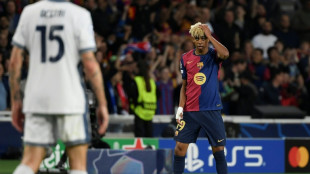
-
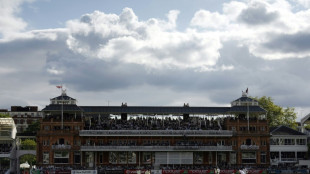 2026 T20 World Cup 'biggest women's cricket event in England' - ECB
2026 T20 World Cup 'biggest women's cricket event in England' - ECB
-
Bangladesh begins three days of mass political rallies
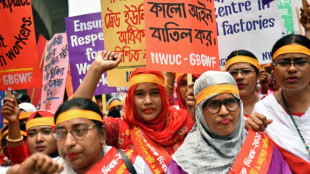
-
 Children learn emergency drills as Kashmir tensions rise
Children learn emergency drills as Kashmir tensions rise
-
Millions of children to suffer from Trump aid cuts
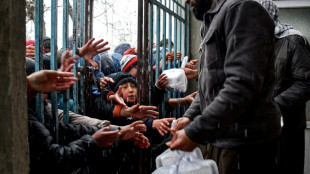
-
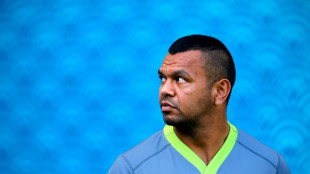 Veteran Wallaby Beale set for long-awaited injury return
Veteran Wallaby Beale set for long-awaited injury return
-
Syria's Druze take up arms to defend their town against Islamists

-
 Tesla sales plunge further in France, down 59% in April
Tesla sales plunge further in France, down 59% in April
-
US calls on India and Pakistan to 'de-escalate'

-
 Israel reopens key roads as firefighters battle blaze
Israel reopens key roads as firefighters battle blaze
-
Europe far-right surge masks divisions

-
 James will mull NBA future after Lakers playoff exit
James will mull NBA future after Lakers playoff exit
-
Ukraine's chief rabbi sings plea to Trump to side with Kyiv

-
 Australian mushroom meal victim 'hunched' in pain, court hears
Australian mushroom meal victim 'hunched' in pain, court hears
-
Lakers dumped out of playoffs by Wolves, Rockets rout Warriors

-
 Booming tourism and climate change threaten Albania's coast
Booming tourism and climate change threaten Albania's coast
-
US reaching out to China for tariff talks: Beijing state media

-
 Tariffs prompt Bank of Japan to lower growth forecasts
Tariffs prompt Bank of Japan to lower growth forecasts
-
Kiss faces little time to set Wallabies on path to home World Cup glory

-
 Serbian students, unions join forces for anti-corruption protest
Serbian students, unions join forces for anti-corruption protest
-
Slow and easily beaten -- Messi's Miami project risks global embarrassment

-
 Fan in hospital after falling to field at Pirates game
Fan in hospital after falling to field at Pirates game
-
Nuclear power sparks Australian election battle

-
 Tokyo stocks rise as BoJ holds rates steady
Tokyo stocks rise as BoJ holds rates steady
-
Bank of Japan holds rates, lowers growth forecasts

-
 'Sleeping giants' Bordeaux-Begles awaken before Champions Cup semis
'Sleeping giants' Bordeaux-Begles awaken before Champions Cup semis
-
Napoli eye Scudetto as Inter hope for post-Barca bounce-back

-
 Germany's 'absolutely insane' second tier rivalling Europe's best
Germany's 'absolutely insane' second tier rivalling Europe's best
-
PSG minds on Arsenal return as French clubs scrap for Champions League places

-
 UK WWII veteran remembers joy of war's end, 80 years on
UK WWII veteran remembers joy of war's end, 80 years on
-
Myanmar junta lets post-quake truce expire

-
 Rockets romp past Warriors to extend NBA playoff series
Rockets romp past Warriors to extend NBA playoff series
-
Messi, Inter Miami CONCACAF Cup dream over as Vancouver advance

-
 UN body warns over Trump's deep-sea mining order
UN body warns over Trump's deep-sea mining order
-
UK local elections test big two parties

-
 US judge says Apple defied order in App Store case
US judge says Apple defied order in App Store case
-
Seventeen years later, Brood XIV cicadas emerge in US

-
 Scorching 1,500m return for Olympic great Ledecky in Florida
Scorching 1,500m return for Olympic great Ledecky in Florida
-
Israel's Netanyahu warns wildfires could reach Jerusalem

-
 Istanbul lockdown aims to prevent May Day marches
Istanbul lockdown aims to prevent May Day marches
-
Former U.S. Attorney and Assistant U.S. Attorney Join National Plaintiff Law Firm Singleton Schreiber as Spokane Partners


With Biden Taiwan warning, US 'ambiguity' gets little clearer
With a warning to China that the United States will defend Taiwan, President Joe Biden has offered the island its loudest reassurance in decades but brought more uncertainty to a US stance designed to be ambiguous.
On a visit to Tokyo, Biden gave an unequivocal yes when asked if the United States would defend Taiwan in an invasion by China, which claims the self-governing democracy off its coast as its own.
"That's the commitment we made," Biden told a news conference, drawing a link between Taiwan and Russia's invasion of Ukraine and calling for Moscow to pay a "long-term price" as a message to China.
But the White House and Pentagon quickly said that US policy "has not changed" on Taiwan, just as Beijing voiced anger over Biden, who has made similar remarks before in lower-profile settings.
Since switching recognition to Beijing in 1979, the United States has committed to providing Taiwan with the means to defend itself but has kept a "strategic ambiguity" on whether it would intervene militarily.
A growing constituency, especially in the Republican Party, advocates a switch to "strategic clarity," believing an explicit promise to defend Taiwan is needed to deter an increasingly assertive and powerful Beijing.
Sung Wen-ti, an expert on Taiwan at the Australian National University, said that Biden was trying to "have the cake and eat it too."
"Biden's 'slip of tongue' and subsequent walking back, when read as a Freudian slip, still increases perceived US resolve -- the goal of strategic clarity -- without incurring the costs of clarity," he said.
- Reassuring Taiwan -
Taiwan's foreign ministry spokeswoman Joanne Ou offered a "sincere welcome and gratitude" to Biden for his "rock-solid commitment."
Bonnie Glaser, Asia director at the German Marshall Fund of the United States, noted that polls in Taiwan had shown a sharp drop since the Ukraine invasion in confidence that Washington would defend the island, following propaganda by Beijing.
Glaser said Biden was also likely seeking to reassure his host, Japanese Prime Minister Fumio Kishida, who has voiced concern about instability in the Taiwan Strait.
Biden "has weakened the policy of strategic ambiguity and I think that's deliberate," Glaser said.
But Glaser said the remarks left unanswered questions and that it was problematic to suggest that the United States would defend Taiwan in all circumstances.
"I think confusion in our policy undermines deterrence," she said.
Biden also suggested that the United States agreed with Beijing on there being only one China, although Washington in the landmark 1972 Shanghai communique said only that it acknowledged Beijing's position.
Just Friday, State Department spokesman Ned Price said that the United States "does not subscribe to the PRC's 'One China principle'" and accused the People's Republic of China of mischaracterizing the US position.
- Bigger stakes than Ukraine? -
In his willingness to defend Taiwan, Biden is deviating sharply from his vocal rejection of committing US troops in Ukraine.
The United States has poured aid into Ukraine, last week approving another $40 billion, but Biden has warned that direct confrontation with Russia risked "World War III."
China, like Russia, has nuclear weapons. But the Biden administration has described Beijing as the only long-term global competitor of the United States.
The United States and Australia have already been voicing alarm that China could extend its reach into the Pacific through a new maritime deal with the Solomon Islands.
And while the Russian invasion of Ukraine has had a major impact on wheat supply to the developing world, Taiwan has a resource vital to the US economy -- semiconductors.
A study this year by the Center for a New American Security noted that Taiwan accounts for 92 percent of the world's most advanced semiconductors.
In a simulation, the think tank saw Taiwan seeking a familiar model "wherein the United States promised to protect the oil-producing Persian Gulf states in a tacit agreement for unfettered access to energy."
The United States has been gradually chipping away at its reticence on Taiwan, letting US officials meet openly with counterparts and pressing for the island's inclusion in international organizations.
Senator Tom Cotton, a hawkish Republican, said that Biden needed to state a shift to "strategic clarity" in a clear, prepared text.
"Otherwise, the continued ambiguity and uncertainty will likely provoke the Chinese communists without deterring them -- the worst of both worlds," he said.
Th.Berger--AMWN